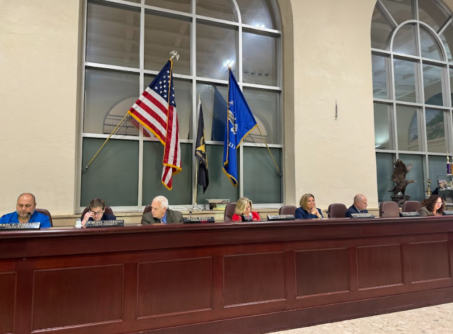The Glen Cove City Council proposed a $65.4 million budget for 2025 on Oct. 8 that calls for an increase in residential property taxes for the first time in three years.
“When compared to the 2024 adopted budget of $63,457,023, the proposed budget increased approximately $2 million or 3.11%,” Glen Cove Mayor Pam Panzenbeck said.
Panzenbeck said $1.6 million of this increase comes from the city’s general fund. The budget is composed of the city’s general fund, water fund, debt service fund and insurance fund.
The mayor said some of the increases, like pension contributions and healthcare premiums, are mandated by the state and are not decided by the city.
“These are not optional,” she said. “These are mandates.”
Panzenbeck said there will be salary increases to city employee positions as well.
“We have to give increases to attract new workers and to keep the workforce that we actually have,” she said.
Panzenbeck also announced a $279,050 tax levy increase. She said the tax levy is “required to balance the budget, ensuring all anticipated expenses are properly funded.”
There has not been a tax increase in the city for three years, she said.
The increase for residential taxes is 1.98%, equating to an approximate $55 yearly increase on a $575,000 home. Commercial properties will see a decrease of -0.61%, which is approximately $47 per year.
“I present to you a balanced budget, which requires a very small tax increase of 1.98% for residential properties,” she said.
“We really did not want to raise taxes 1.98%,” she said. “And because we have not raised taxes in three years, we could have come pretty close to 6%. But we’re always thinking about all of out.”
Panzenbeck said the city will mitigate this increase primarily by reducing anticipated severance costs and tax refunds.
The mayor also said the council does not expect to receive payment from the RXR ferry pilot program as originally planned.
“This proposed budget is challenged, if you look at that screen, by the RXR Garvies Point pilot payment expected to go unpaid for 2025 for the amount of $1.75 million,” Panzenbeck said at the meeting. “We are not getting that this year.”
“We also have not received the 2024 expected pilot payment in the form of $1.15 million, which both are part of the payment schedule included in our agreement with RXR,” she said.
Together, these two unpaid payments accumulate to $2.35 million.
“We are going to get that someday, but I don’t believe it’s going to be any day soon,” Panzenbeck said.
“What kind of a penalty is imposed on paying pilots late?” asked resident Dave Neri. “It’s like us paying taxes. We get penalized if we pay our taxes late. It’s not accepted if we don’t pay the full amount.”
“They have not breached the contract,” said Council Member Marsha Silverman.
Silverman said the payment schedule is determined by the number of units built on Garvies Point.
“It’s just that there was a schedule based on a reasonable schedule of the buildings,” Silverman said. “The buildings have not been built yet; they don’t have to pay for that.”
“It was honestly a bad contract without dates and deadlines that the city entered back in 2016,” she said.
“I continue to pay 100% of anything that I do owe in the form of a pilot payment,” said Joe Grazioise, EVP of residential development and construction. Grazioise said RXR will start developing new buildings this upcoming year.
“The City and Glen Cove IDA have been in discussions with RXR regarding the Garvies Point pilot payments since early 2024, once notified by RXR of the lack of payment expected for the year,” Panzenbeck said.
She said affected tax jurisdictions, like the county, library and school district, were notified as well.
“The last payments per the schedule was received in 2023,” she said.
Despite the missing payment in 2024, the New York State Comptroller’s Office reported that Glen Cove is under no fiscal stress as of the 2023 fiscal year, the city said.
This marks the first time that the city has not been under fiscal stress in six years, officials said.
The city has had three consecutive years of $5 million surplus, and at the end of the 2023 fiscal year, these surpluses eliminated the city’s operating deficit in the general fund, Panzenbeck said.
“That’s a significant improvement from the time we took office, when the fund balance deficit was over $2 million,” she said.
The mayor said the city is “$362,000 shy from having reserves in our total fund balance within the general fund.”
“Everybody has reserves,” she said. “The large townships and the county all have big reserves. We do not. And we are working to get there.”
Panzenbeck said the city is working to ensure the best results for the 2025 budget.
“My team will manage all the risks and opportunities as they present themselves. And we promise to work diligently and relentlessly to achieve the same positive results we have had in the past,” Panzenbeck said.
































